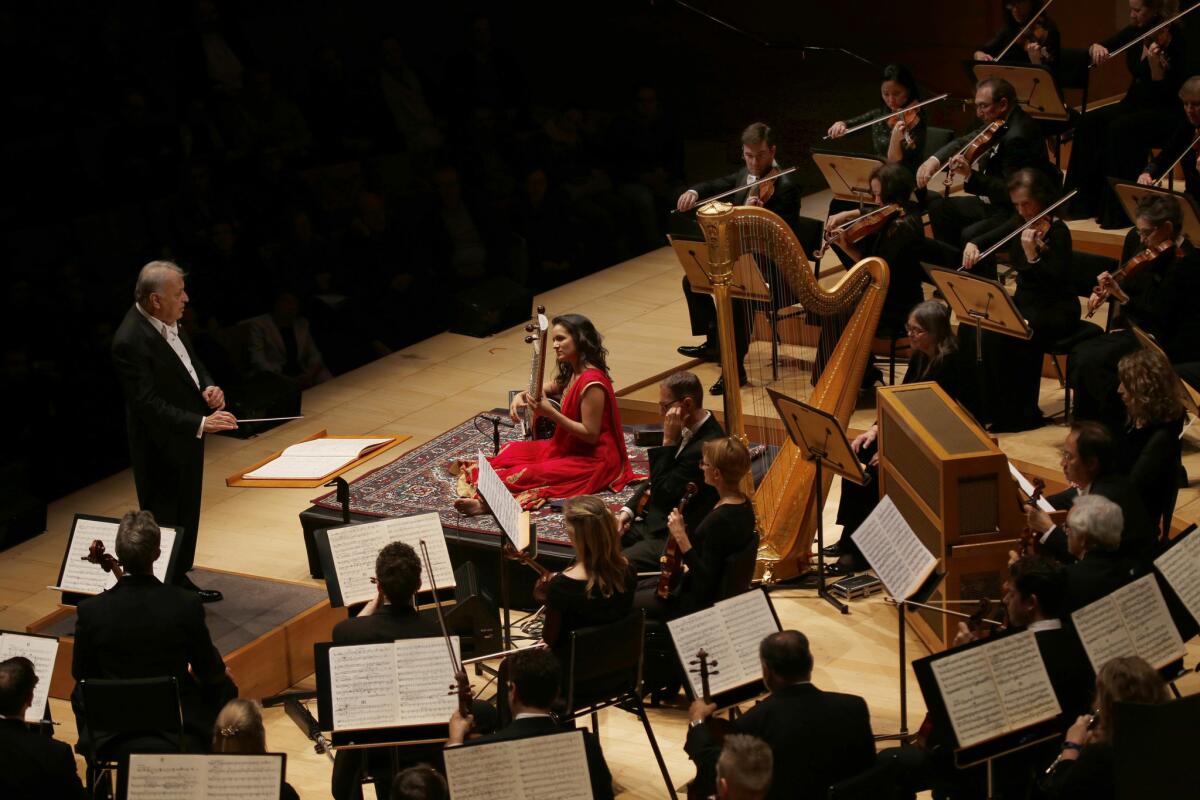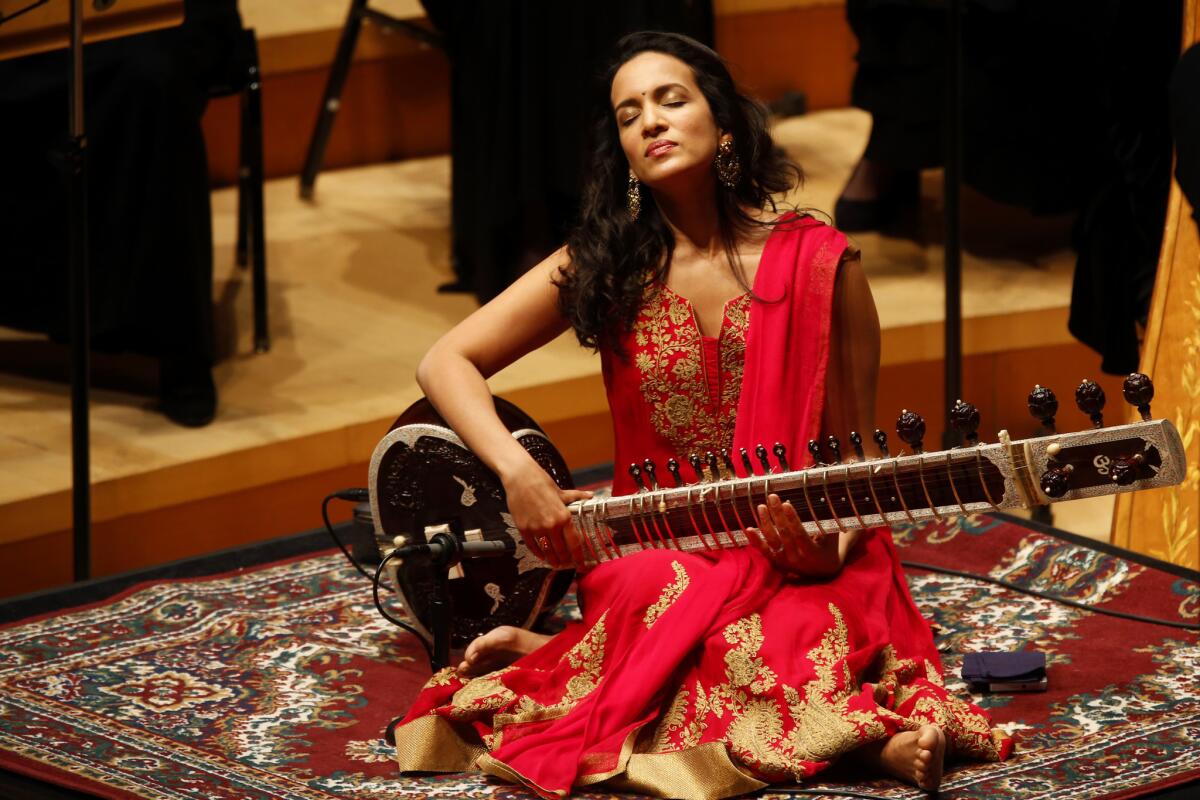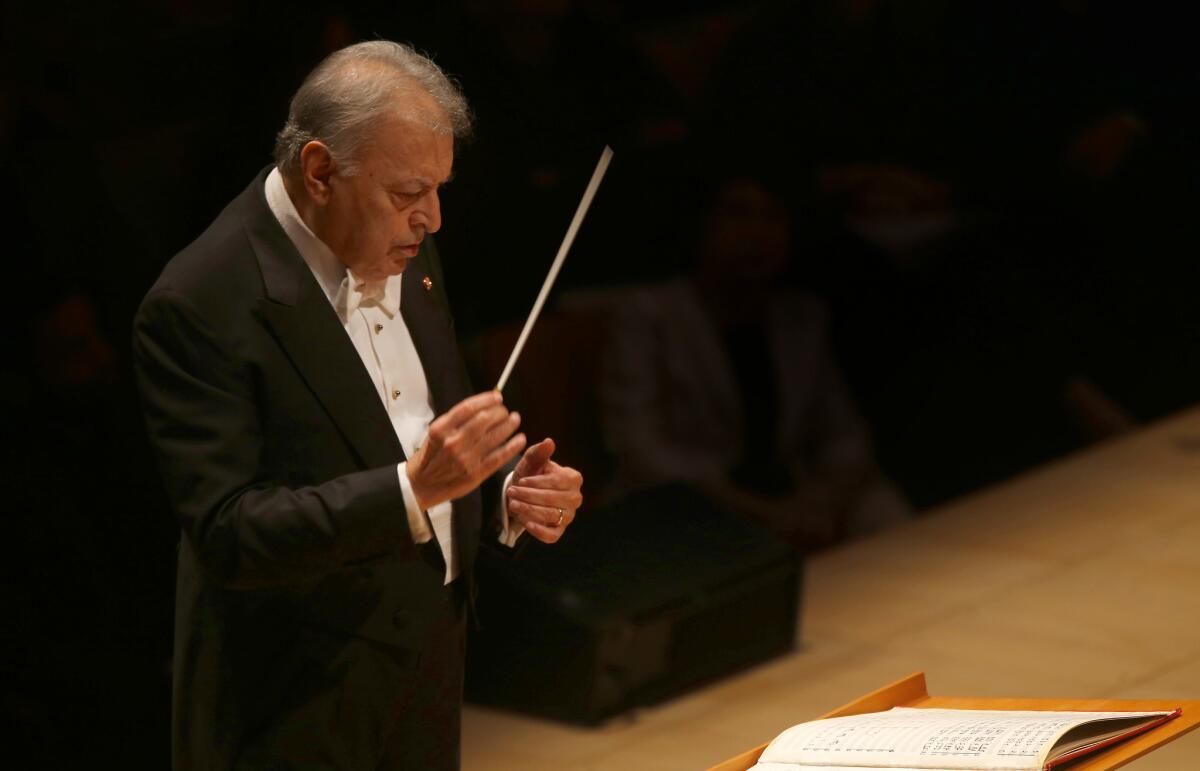Review: Zubin Mehta’s L.A. return gives Shankar raga a proper home and makes Strauss hero’s journey personal

I prepared for the Los Angeles Philharmonic’s concert at Walt Disney Concert Hall on Friday night by listening to a recording of Ravi Shankar playing the lovely dawn raga “Lalit” as L.A.’s morning light poured in the window. It was a marvelous way to start the day.
“Lalit” is the source material for the opening of Shankar’s Second Sitar Concerto (“Raga Mala”), which was written for the New York Philharmonic and waited more than 35 years to finally arrive on the West Coast, where it belongs. It was a marvelous way to end the day.
Zubin Mehta, who premiered the concerto in 1981, conducted. Anoushka Shankar, the late composer and sitarist’s daughter, was soloist.
Although Mehta and Shankar were friends (both moved to L.A. in the 1960s) and Shankar appeared with the L.A. Phil at the Hollywood Bowl in 1970 (with Lawrence Foster conducting), Mehta only commissioned the concerto after he became music director of the New York Philharmonic. But Friday night, the concerto finally felt like it came home.

That homecoming had something to do with the L.A. light, of course, but also with the openness of the Disney environment and the warm generosity of the hall’s sound (with the sitar subtly and suitably amplified) and the sense of freedom that L.A. Phil brings to new music. Still, a symphony orchestra was never quite a home away from home for Shankar.
Having forged intense musical relationships with the likes of Yehudi Menuhin, George Harrison and Philip Glass (as well as having written inspired film scores for Indian and Western features), Shankar knew a thing or two about collaboration and how to remain in his element no matter what. He and Mehta (who called Shankar his guru) may have shared a homeland, culture and love for Southern California, but they didn’t share a musical language. The sitarist never mastered Western notation; the conductor never learned traditional Indian notation.
Shankar, nonetheless, remained continually cognizant of Mehta’s musical desires and a Western orchestra’s strengths and needs. Rather than beginning his concerto like a raga with the slow warming up and introducing of a musical scale, he throws Mehta a bone with a chest-thumping orchestral flourish. The first movement does take its time developing the scale and melodic material of “Lalit” through solo sitar improvisations and colorful instrumental solos. But the later three movements begin piling on the ragas — 21 in the collage-like last movement.
I don’t know how aware Shankar might have been of the new music series that Mehta was beginning in New York in the early 1980s that helped usher in musical Post-Minimalism and Postmodernism, and for which Mehta has not been given nearly enough credit, but Shankar did his bit in this nearly hour-long work that covers as many bases and breaks down as many barriers as it does.
Improvisation is its key. Anoushka is a more understated player than was her father, but she is a remarkable virtuoso and fluent improviser, able to bring a hint of more modern Western elements to her style. Her solos flowed with seeming ease as from a single source.
The concerto remains, though, a considerable stretch for orchestral players. Shankar gave many of them killer solos, and there were some dazzling ones from trumpeter Thomas Hooten, clarinetist Burt Hara and violinist Nathan Cole, along with a beautiful interplay between sitar, cello (Ben Hong) and harp (Lou Anne Neill). Even so, a certain reticence could be felt as the orchestra, with Mehta an avuncular leader, putting most of his effort in helping the ensemble find its way.
There was no such reticence after intermission in Strauss’ “Ein Heldenleben.” Long a Mehta specialty — he has recorded the tone poem four times over the past half century, with the most exciting his 1979 recording with the L.A. Phil — Mehta made a magnificent performance seem, for him, unusually self-reflective. Strauss’ narrative covers the life of the composer/hero, though here it might have been Mehta, who turned 80 last April, looking back.

The hero bounds in godlike, which reminds us of Mehta as a glamorously flashy conductor in his early 20s. Strauss contends with the critics, here chirpy winds and brass, and Mehta went through that big time in Los Angeles and New York. There is the love life (Mehta was a man about town), the battles (Mehta’s 13 New York Philharmonic years were spent in a tough, unforgiving place). Then come the works of peace (Tel Aviv is an even tougher town where Mehta has been music director of the Israel Philharmonic for half a century and where an ongoing struggle for peace goes with the territory).
“Heldenleben” ends with the hero’s retirement from this world and completion. That Mehta has not yet done. He walks slowly and in past months has canceled performances for health reasons — he just announced that he will step down from the Israel Philharmonic next year. But he looked fit Friday.
His masterly “Heldenleben” was imperious when it needed to be. Martin Chalifour’s violin solos in the sections of romance had the vitality of suavely virtuosic solo interactions in Shankar’s concerto.
Just as “Heldenleben” dies away at the end, there is a big fortissimo attack in the winds, brass and percussion. It is the hero’s last word. Mehta always loved overdoing that, making it an audience-pleasing knockout punch. He did so once more, but no longer throwing his body into it. He now only needs a flick of the wrist.
And with the flick of his wrist, gone was the bombast. Instead, Mehta turned that attack into a brilliant effect capping a brilliantly affectionate performance with the one orchestra that makes, with full justification and apparent love, Mehta smile.
Los Angeles Philharmonic
Where: Walt Disney Concert Hall, downtown Los Angeles
When: 8:00 p.m., Sat.; 2:00 p.m., Sun.
Cost: $64 to $200
Info: (323) 850-2000 or www.laphil.org
On Twitter: @markswed
ALSO
Obama left the NEA vulnerable. Could Sylvester Stallone save it?
Review: With a magnificent Piano Spheres recital, Mark Robson resonates in the new year
More to Read
The biggest entertainment stories
Get our big stories about Hollywood, film, television, music, arts, culture and more right in your inbox as soon as they publish.
You may occasionally receive promotional content from the Los Angeles Times.











